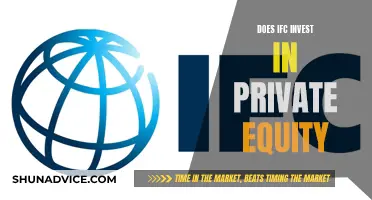
Personal investment management is a service that helps individuals achieve their financial goals and objectives through the professional management of their securities and assets. It involves building a portfolio of stocks, bonds, and other investments based on an individual's goals, risk tolerance, and financial priorities. This process can be done independently or with the help of an investment manager, who provides financial planning and advising services to ensure the portfolio remains aligned with the individual's needs.
| Characteristics | Values |
|---|---|
| Definition | The process of building a portfolio of stocks, bonds and other investments based on your goals |
| Who does it? | You can hire an investment management service, or manage your portfolio yourself |
| What it includes | Purchasing and selling assets; creating short- or long-term investment strategies; overseeing a portfolio's asset allocation; developing a tax strategy |
| Who it's for | Individual or institutional investors |
| Types of investor | High-net-worth individuals; pension funds; retirement plans; governments; educational institutions; insurance companies |
| Other names for investment management | Money management; portfolio management; wealth management |
| Typical fee structure | A small percentage of the value of the portfolio held for a client; a share of the annual gains; a fixed fee; a flat fee; an hourly fee; a performance fee; wrap fees |
What You'll Learn

Investment management services
The process of investment management involves building and maintaining a portfolio of stocks, bonds, and other investments. This includes purchasing and selling assets, creating short- and long-term investment strategies, overseeing a portfolio's asset allocation, and developing a tax strategy.
Investment managers conduct in-depth research and analysis to make informed investment decisions. They develop and implement investment strategies, allocate assets, manage risk, and monitor the performance of their clients' portfolios.
The fees for investment management services can vary and are typically structured in a few different ways. Some managers charge a small percentage of the client's assets, while others may charge a fixed percentage of the total value of the client's portfolio. Performance-based fees are also common, where the manager's fee is tied to their ability to achieve specific performance targets.
When choosing an investment management service, it is essential to carefully evaluate their expertise, investment strategies, and fee structures to ensure they align with your unique financial goals and risk tolerance.
Waste Management: A Guide to Smart Investing
You may want to see also

Financial planning
- Retirement planning: This is a critical component of financial planning, involving strategies to ensure individuals have sufficient funds to maintain their desired standard of living during retirement. This may include contributing to pension plans, 401(k)s, or other retirement accounts.
- Education funding: Planning for future education expenses, such as college or university tuition fees, is an important consideration for individuals with children or those planning to start a family.
- Estate planning: Financial planning assists in structuring an individual's estate to efficiently pass on wealth to heirs or charitable organizations. This may involve the use of wills, trusts, and other estate planning tools.
- Tax planning: Developing tax-efficient strategies is crucial to minimizing tax liabilities. Financial planners help individuals navigate capital gains taxes, income taxes, and estate taxes.
- Cash flow management: Financial planning aids in budgeting, expense tracking, and optimizing cash reserves to meet short-term and long-term financial goals.
- Philanthropic planning: For individuals interested in philanthropy, financial planners can provide guidance on charitable donations and strategies to achieve their philanthropic goals.
When creating a financial plan, it is essential to consider an individual's unique circumstances, including their income, expenses, savings, investments, and protection needs. This holistic approach to financial planning ensures that all aspects of an individual's financial life are considered and integrated into their investment strategies.
Crafting a Winning Investment Portfolio: Sample Strategies
You may want to see also

Tax planning
Personal investment management is a service that helps investors achieve their financial goals through the professional management of their securities and assets. Investment management can be done independently or with the help of a professional investment manager.
- Saving for retirement in an IRA (Individual Retirement Account)
- Tax gain-loss harvesting: using a portfolio's losses to offset overall capital gains
- Contributing to a 401(k) plan: participants can defer income from their paycheck directly into the company's 401(k) plan
- Investing in municipal bond funds or ETFs: interest from municipal bonds may be exempt from federal taxes and, depending on the state of residence, state and local taxes
- Timing of income, size, and timing of purchases: for example, the timing of claiming social security retirement benefits
- Planning for expenditures: for example, the impact of total taxable income on the cost of healthcare
It is important to note that only a qualified tax professional can give specific tax advice.
Understanding Investment Portfolio Beta: A Beginner's Guide
You may want to see also

Estate planning
- Appointing the right executor: The legal personal representative or executor is responsible for resolving the financial affairs of the deceased, including locating and overseeing all assets. They must also pay off any taxes and debts from the estate.
- Planning for estate taxes: Federal and state taxes applied to an estate can significantly reduce its value before distribution to beneficiaries. Various strategies can be employed to minimise these taxes, such as creating trusts or making charitable donations.
- Using life insurance: Life insurance can serve as a source to pay death taxes and expenses, fund business buy-sell agreements, and fund retirement plans. It can help pay any income tax on the deemed dispositions of assets following an individual's death.
- Preparing a will: A will is a legal document that provides instructions on how an individual's property and custody of minor children should be handled after their death. It also indicates whether a trust should be created after death.
- Avoiding unnecessary probate costs: Probate is the court-supervised procedure that proves the authenticity of a will. It can be an expensive and lengthy process, so careful estate planning can help minimise these costs.
- Reviewing accounts and insurance: It is important to regularly review your retirement accounts and insurance policies to ensure beneficiary information is up-to-date and accurate.
- Setting up joint accounts: Joint accounts, such as checking and savings accounts, do not need to go through probate if there is a right of survivorship. This means the account moves directly to the surviving owner.
- Funeral arrangements: Estate planning can include setting up funeral arrangements to ensure your wishes are carried out.
- Power of attorney: Establishing a durable power of attorney can direct other assets and investments. A power of attorney for health and finances may also be necessary as you age.
- Other savings vehicles: There are tax-advantaged investment vehicles, such as 529 college savings plans, that can benefit you and your beneficiaries.
Maximizing Cloud Investment: Azure Cost Management Strategies
You may want to see also

Cash flow management
For individuals, cash flow management involves consolidating personal financial accounts, such as investment, saving, and checking accounts, within a single financial institution. This provides a comprehensive view of cash inflows and outflows, enabling better decision-making.
A key metric in cash flow management is the net cash flow, calculated by subtracting total cash outflow from total cash inflow. A positive net cash flow indicates that an individual's liquid assets are increasing, enabling them to cover obligations, reinvest profits, and build a financial buffer.
Individuals can also utilise cash management accounts, such as money market accounts, which offer both high-yield interest rates and check-writing privileges. These accounts provide a convenient way to maintain cash balances for expenses while earning a return on the deposited funds.
Additionally, individuals can employ various internal controls and accounting mechanisms to ensure efficient cash flow management. This includes monitoring key metrics such as the average length of accounts receivable, collection processes, write-offs for uncollected receivables, liquidity, and rates of return on cash equivalent investments.
By actively monitoring and managing their cash inflows and outflows, individuals can make more informed decisions about their savings and investments, ultimately improving their financial well-being.
Saving or Investing: Where Should Your Money Go?
You may want to see also
Frequently asked questions
Personal investment management is the process of building a portfolio of stocks, bonds and other investments based on your financial goals. It can be done independently or with the help of an investment manager.
An investment manager is a person or company that manages an investment portfolio on behalf of a client. They devise an investment strategy to meet the client's goals and then use that strategy to decide how to divide the client's portfolio among different types of investments.
Personal investment management helps individuals make the most of their money by ensuring their portfolio aligns with their financial goals, risk tolerance and priorities. It can also help to build generational wealth and narrow the wealth gap.







